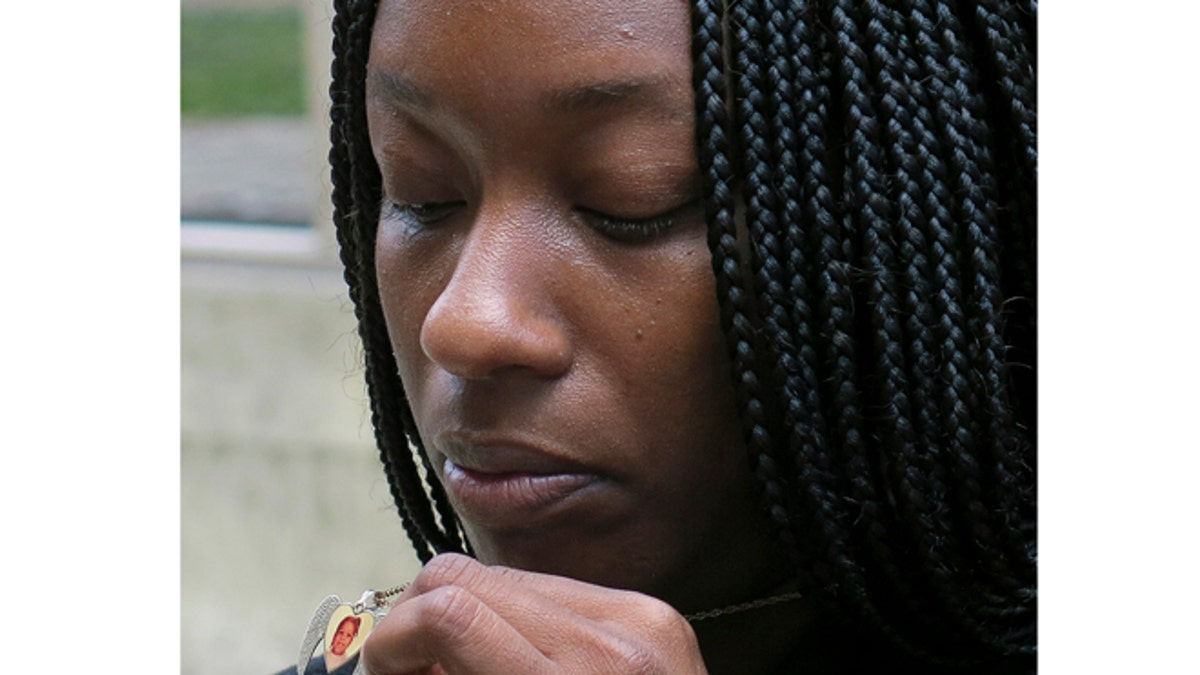
April 24, 2014: This photo shows Tarshia Williams displaying a pendant with her daughter, Talia's face on it outside of a federal courthouse in Honolulu. (AP)
HONOLULU – Jurors in Hawaii are set to begin considering whether a former soldier should be sentenced to death or life in prison for killing his 5-year-old daughter.
Jurors deliberated for about a day before announcing a verdict Friday finding Naeem Williams eligible for the death penalty in the first capital case in the history of Hawaii's statehood.
The jury returns to court on Wednesday to begin hearing testimony about whether he will be sentenced to death or life in prison with no possibility for release.
That phase in the case will include a new round of opening statements and deliberations. The defense is expected to present witnesses testifying about Williams as a person while the prosecution is expected to continue arguing that the crime was especially heinous and deserving of the death penalty.
The same jury last month convicted Williams of murder in his daughter Talia's 2005 beating death. The drawn-out case has gained attention in part because it involves a capital offense in a state that doesn't have the death penalty.
Hawaii's territorial government abolished capital punishment in 1957, before Hawaii became a U.S. state in 1959. But Williams was tried in the federal system — which allows for the death penalty — because the crime occurred on military property.
Lawyers for both the prosecution and defense declined comment Friday after the jury's eligibility decision was read.
Williams' defense team argued he was not eligible for a death sentence because of his low IQ. Mental health experts testified about intellectual impairments and low test scores.
The prosecution contended factors such as Talia's age and vulnerability made the killing so heinous that the death penalty was warranted.
Jurors decided Williams met all key conditions to be eligible for the death penalty: He was an adult; his actions were intentional that resulted in the girl's death; and the crime was especially heinous and the victim was vulnerable because of her youth.
One juror appeared to cry as jurors were polled.
Williams and Talia's stepmother, Delilah Williams, testified during the guilt phase of the trial that they beat her almost daily with hands and belts during the seven months she lived with them in Hawaii.
Naeem Williams blamed the beatings on the child's bowel- and bladder-control issues, coupled with frustrations he faced in his marriage.
His wife, Delilah, testified against him as part of a deal with prosecutors for a 20-year sentence. She provided graphic and disturbing details of abuse that included withholding food from the girl for days at a time, beatings while the child was duct-taped to a bed, pulling her so hard by the hair that she was left with a bald spot, and stomping on her until bone cracked.
The couple eventually took the kindergartner out of school so that others wouldn't see the signs of abuse on Talia's body.
Prosecutors say she died on July 16, 2005, after her father dealt a blow so hard it left knuckle imprints on her chest. Naeem Williams said he beat the girl that day partly because of toothpaste she spit onto the bathroom sink.
The resolution of the case also paves the way for Delilah Williams' sentence. Her public defender, Alexander Silvert, requested that she be immediately sentenced and moved to a mainland prison after she testified, satisfying terms of her plea deal.
But U.S. District Judge J. Michael Seabright ruled that Delilah Williams must wait until jurors in Naeem Williams' trial have been dismissed before she can be sentenced.

